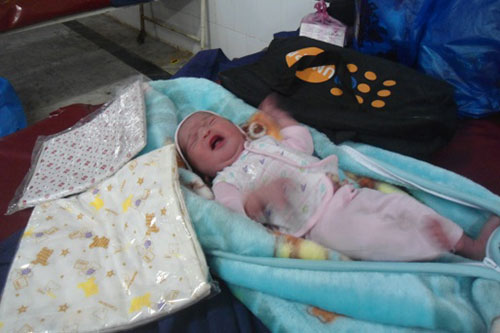News
UNFPA responds to needs of 36,000 pregnant women displaced in Pakistan
- 28 July 2014
News
ISLAMABAD, Pakistan – Kiran Azeem Khan, 30, and her five children were forced to flee their home in Miran Shah, in Pakistan’s North Waziristan Agency, after military operations commenced there in late June. They left without money or supplies. Ms. Khan was also pregnant – and nearing her due date.
“I was extremely worried, as I left with nothing and had no money for hospital charges,” she said.
Nearly 1 million people from Pakistan’s North Waziristan Agency have been displaced, according to the latest figures from the Government’s Provincial Disaster Management Authority (PDMA). UNFPA estimates that 74 per cent of these internally displaced people are women and children, and at least 36,000 are pregnant.
UNFPA, together with and its NGO partner the Network for Human and Social Development, is supporting the Government’s National Health Emergency Preparedness and Response Network, helping to ensure that pregnant women are able to safely deliver and providing women of reproductive age with essential hygiene supplies.
Last week, Ms. Khan gave birth at the UNFPA-supported Zanana Women and Children Teaching Hospital in Bannu City.

“I am very happy that I was able to deliver in a hospital, and that I was provided clean delivery and newborn baby kits,” she said. “My beautiful daughter, Gul, looks lovely in her new clothes.”
Most of the displaced have, like Ms. Khan, sought shelter in the Bannu District of Khyber Pakhtunkhwa Province. The vast majority are living in cramped surroundings, either with host families or in public buildings, amid stifling heat.
The Government and humanitarian agencies are providing food, essential medical supplies, drinking water and shelter items, but the response urgently needs to be scaled up.
Health facilities are overwhelmed by demand, and the lack of female medical staff to provide care for displaced women is a critical challenge. UNFPA has taken part in rapid assessments of health and protection needs, and has begun to distribute hundreds of clean delivery kits, newborn baby kits and dignity kits with personal hygiene items.
As part of the coordinated humanitarian response to the emergency, in partnership with the PDMA, UNFPA is leading working groups on reproductive health and protection against gender-based violence.